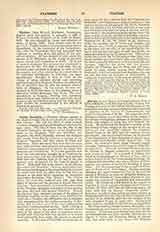

Flavian, Saint, Bishop of Constantinople, date of birth unknown; d. at Hypaepa in Lydia, August, 449. Nothing is known of him before his elevation to the episcopate save that he was a presbyter and skeuophulaks, or sacristan, of the Church of Constantinople, and noted for the holiness of his life. His succession to St. Proclus as bishop was in opposition to the wishes of the eunuch Chrysaphius, minister of Emperor Theodosius, who sought to bring him into imperial disfavor. He persuaded the emperor to require of the new bishop certain eulogice on the occasion of his appointment, but scornfully rejected the proffered blessed bread on the plea that the emperor desired gifts of gold. Flavian’s intrepid refusal, on the ground of the impropriety of thus disposing of church treasures, roused considerable enmity against him. Pulcheria, the emperor’s sister, being Flavian’s stanch advocate, Chrysaphius secured the support of the Empress Eudocia. Although their first efforts to involve St. Flavian in disgrace miscarried, an opportunity soon presented itself. At a council of bishops convened at Constantinople by Flavian, November 8, 448, to settle a dispute which had arisen among his clergy, the archimandrite Eutyches, who was a relation of Chrysaphius, was accused of heresy by Eusebius of Dorylaeum. Flavian exercised clemency and urged moderation, but in the end the refusal of Eutyches to make an orthodox declaration on the two natures of Christ forced Flavian to pronounce the sentence of degradation and excommunication. He forwarded a full report of the council to Pope Leo I, who in turn gave his approval to Flavian’s decision (May 21, 449), and the following month (June 13) sent him his famous “Dogmatic Letter”. Eutyches‘ complaint that justice had been violated in the council and that the Acts had been tampered with resulted in an imperial order for the revision of the Acts, executed (8 and April 27, 449). No material error could be established, and Flavian was justified.
The long-standing rivalry between Alexandria and Constantinople now became a strong factor in the dissensions. It had been none the less keen since the See of Constantinople had been officially declared next in dignity to Rome, and Dioscurus, Bishop of Alexandria, was quite ready to join forces with Eutyches against Flavian. Even before the revision of the Acts of Flavian’s council, Chrysaphius had persuaded the emperor of the necessity for an ecumenical council to adjust matters, and the decree went forth that one should convene at Ephesus under the presidency of Dioscurus, who also controlled the attendance of bishops. Flavian and six bishops who had assisted at the previous synod were allowed no voice, being, as it were, on trial. Eutyches was absolved of heresy, and despite the protest of the papal legate Hilary (later pope), who by his Contradicitur annulled the decisions of the council, Flavian was condemned and deposed. In the violent scenes which ensued he was so ill-used that three days later he died in his place of exile. Anatolius, a partisan of Dioscurus, was appointed to succeed him.
St. Flavian was repeatedly vindicated by Pope Leo, whose epistle of commendation failed to reach him before his death. The pope also wrote in his favor to Theodosius, Pulcheria, and the clergy of Constantinople, besides convening a council at Rome, wherein he designated the Council of Ephesus Ephesinum non judicium sed latrocinium. At the Council of Chalcedon (451) the Acts of the Robber Council were annulled and Flavian eulogized as a martyr for the Faith. Pope Hilary had Flavian’s death represented pictorially in a Roman church erected by him. On Pulcheria’s accession to power, after the death of Theodosius, she brought the remains of her friend to Constantinople, when they were received in triumph and interred with those of his predecessors in the see. In the Greek Menology and the Roman Martyrology his feast is entered February 18, the anniversary of the translation of his body. Relics of St. Flavian are honored in Italy.
St. Flavian’s appeal to Pope Leo against the Robber Council has been published by Amelli in his work “S. Leone Magno e l’Oriente” (Monte Cassino, 1890), also by Lacey (Cambridge, 1903). Two other (Greek and Latin) letters to Leo are preserved in Migne, P.L. (LIV, 723-32, 743-51), and one to Emperor Theodosius also in Migne, P.G. (LXV, 889-92).
F. M. RUDGE

